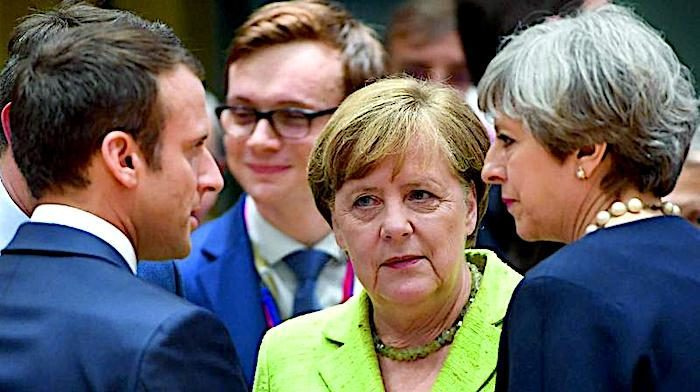Europe’s Moment of Truth

US President Donald Trump's decision to withdraw the US from the Iran nuclear deal and to re-impose the nuclear-related sanctions on Iran irrespective of Iran's full compliance with the historic agreement has put the US and its European allies on collision course. Contradicting Trump's false claim of a Europe "unified" with the US against the Iranian threat, various European leaders have denounced his ill-advised decision and vowed to take concrete action to protect the JCPOA (Joint Comprehensive Plan of Action). As a result, a crisis in transatlantic relations is brewing that has put Europe's credibility, independence, and even identity on line, requiring a unified anti-Trump stance that would back strong words with even stronger actions. Otherwise, as Iran has warned, the JCPOA is doomed, in which case Europe has to reckon with the prospect of an escalating conflict spiral at its doorsteps threatening its security interests.
But, the big question is, of course, what can the European governments do to protect the JCPOA? One simple answer is to fully implement their various obligations under the JCPOA, which include the commitment to prevent interference in the full realization by Iran of the economic benefits associated with the lifting of sanctions, or to disregard US' ban on the sale of commercial airplanes to Iran and protect their aviation industry, and other industries, engaged in business relations with Iran within the legal framework of the post-JCPOA era. In other words, Iran is not asking Europe to undertake any extra-JCPOA steps and is rightfully unhappy with certain European governments that until recently toyed with the notion of 'add-ons' to the JCPOA, i.e., a dreadful mistake that was fully taken advantage of by Trump's 'war party' in the White House. Indeed, the mess that Europe finds itself today is partly a mess of its own making, for if Europe had stood up to US earlier and sent the right signals then chances are that the Trump administration would not tear the agreement and, falsely, expect Europe to toe the line.
Clearly, the White House has misread the European sentiment and did not anticipate the strong European backlash manifested in the resolute pro-JCPOA statements of Chancellor Angela Merkel and EU's foreign policy chief, Federica Mogherini, among others. President Macron too has openly questioned Trump's decision but has let his economic minister to fire the hottest volley by accusing the US of seeking to turn Europe into its vassal. Similarly, the editorial at the Der Spiegel has accused the White House of "colonial" mind-set; the magazine's cover "End of Europe" epitomizes the growing consensus throughout Europe that Uncle Sam has mistreated Europe by ignoring their opinion on Iran and threading a path of confrontation with Iran that could result in war and a great deal of insecurity for a Europe still reeling from the refugee crisis of the Syrian conflict. Perhaps US prefers a weak Europe at America's beckoning!
A sound European counter-strategy is therefore badly needed that would seek to neutralize the US' "secondary sanctions" and allow normal Iran-Europe trade, which has grown dramatically since the JCPOA went into effect over two years ago. The passage of so-called "blocking regulations" to block the US penalties on European firms is an absolute necessity, without which few European firms would take the risk of Iran market given the likelihood of US penalties. Another remedy is government financing of Iran trade, as already begun by France, which should become the norm across the EU landscape, thus forming yet another important assurance to Iran as requested by Tehran. Smaller European companies that do not necessarily deal with US can be encouraged to take a leading role, instead of the big multinationals that have vested interests in the US and are naturally more hesitant to get involved with Iran now, irrespective of their government's political stance.
Indeed, the latter points at one of the fundamental weaknesses of any European official response, that is, the fact that these governments cannot dictate to their private sector, only to create legal protections and perhaps a number of incentives, but ultimately for the most part the decision to invest and trade is a company prerogative that as usual takes into consideration the risk factors. In turn, this makes it incumbent on Europe not to limit itself to incremental measures but rather formulate a coherent rollback strategy aimed at reversing Trump's fateful decision on Iran, which can come about only through a mix of smart diplomacy and stick of economic punishment, e.g., penalizing the US companies in return and thus taking on the risk of a trade war. Unfortunately, short of such stiff measures, it is highly unlikely that Trump would change his mind, in which case the JCPOA is doomed simply because it involves a quid pro quo, nuclear concessions for economic benefits and, in case the latter is not forthcoming to Iran, then there is absolutely no reason for Iran to continue to adhere to the JCPOA.
In conclusion, in order to assure Europe of Iran's serious intention to walk out of the JCPOA in the absence of the required guarantee, it may be necessary for Iran to fire a few shots across the bow of European ship of diplomacy by, for example, suspending most of the IAEA inspections pending the outcome of the present negotiations between Iran and the powers. A JCPOA minus Europe is more likely if Europe does not take Iran's warnings to the heart.

